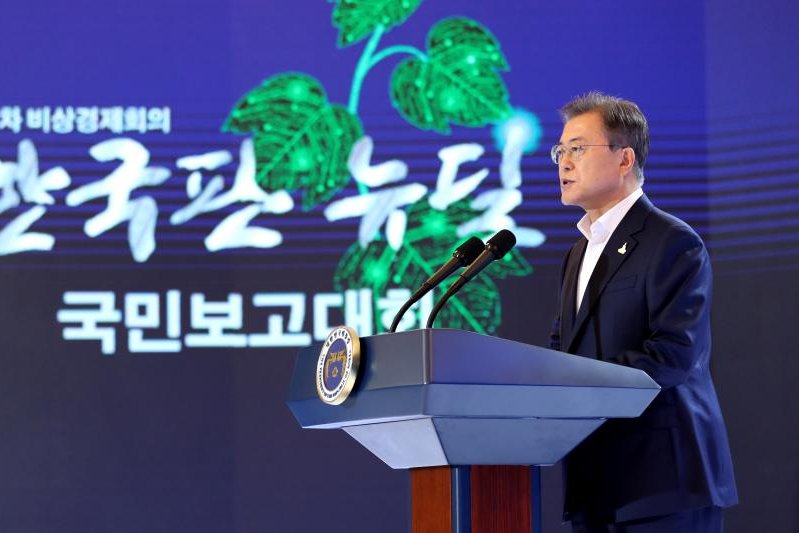President Moon Jae-in announces details of the $133 billion "Korean New Deal" in Seoul on Tuesday. Photo by Yonhap
SEOUL, July 14 (UPI) -- President Moon Jae-in on Tuesday declared his government's aim to "fundamentally change" South Korea through a package of economic, environmental and social reforms he is billing as the Korean version of the New Deal.
During a televised speech at the presidential Blue House, Moon laid out some details of the $133 billion plan, which he said would help overcome the COVID-19 crisis and transform South Korea into a country that will become a leader of the global economy in the coming years.
"From a pursuing economy to a leading economy, from a carbon-dependent economy to a low-carbon economy, from an unequal society to an inclusive society, it is the government's strong will to fundamentally change South Korea," Moon said.
Moon predicted that 1.9 million new jobs would be created by 2025 under the plan. By the end of Moon's five-year presidential term in 2022, 890,000 jobs would be created, he said.
The New Deal, originally announced in April as part of a coronavirus stimulus package, is built around two components: a digital New Deal and a green New Deal.
The green New Deal looks to move South Korea away from its heavy dependency on fossil fuel with investments in areas such as renewable energy, eco-friendly buildings, electric vehicles and telemedicine.
Meanwhile, the digital New Deal will look to leverage South Korea's robust technology infrastructure to take a leading role in industries such as 5G, artificial intelligence and big data.
"We have the skills and capabilities to lead the digital revolution," Moon said. "With bold and proactive investment in all areas of life, including society, economy, education, industry and medical care, we will advance to become the world's top digital country."
The national government will directly invest around $95 billion in the New Deal projects, while the remaining funds would come from local governments and private investment, Moon said.
The government is also aiming to reduce social inequality, he added, noting that the coronavirus pandemic exposed the vulnerability of the social safety net for many, including freelancers and contract workers.
Unemployment insurance benefits will be expanded under the New Deal, while the government will invest directly in job creation and job training.
The New Deal refers to the series of programs enacted by U.S. President Franklin D. Roosevelt in the 1930s to help pull the United States out of the Great Depression.
South Korea's economy has been hit hard by the coronavirus, shrinking 1.3 percent in the first quarter of 2020 in its sharpest contraction since the global financial crisis of 2008. The Bank of Korea is forecasting that the economy will shrink by 0.2 percent in 2020, while the International Monetary Fund recently revised its forecast downward to a decline of 2.1 percent for the year.
The government has pledged $225 billion in stimulus this year to help prop up the economy and minimize the impact of the coronavirus.
On the political front, it remains to be seen whether this ambitious project will boost Moon's flagging approval ratings. While the president had seen his popularity rating rise to 71 percent in May over his administration's handling of the COVID-19 pandemic, that figure tumbled to 47 percent in a Gallup poll released Friday, based in large part over soaring housing prices in an overheated real estate market that he's been unable to tame.
Deteriorating relations with North Korea also have taken a toll on Moon's approval, as Pyongyang cut off all communications with Seoul and destroyed an inter-Korean liaison office last month in retaliation for defectors sending information leaflets on balloons across the border.
In Tuesday's address, Moon touted South Korea's extraordinary development over the past century as it weathered colonization, war and division to grow into the world's 12th-largest economy. However, he said that now is the time for South Korea embark on a new path.
"The growth of the old way is now at its limit, and the shadow of inequality remains dark," he said. "The post-coronavirus era marks a new 100-year path toward a leading economy, an aggressive response to climate change and a great transition to an inclusive society. For the future of Korea, it is a task that can no longer be delayed."
Visitors wear face masks as they tour the Whitney Museum of American Art as it reopens on September 3. Photo by John Angelillo/UPI |
License Photo
















